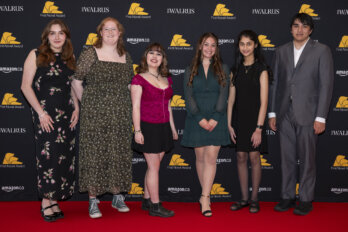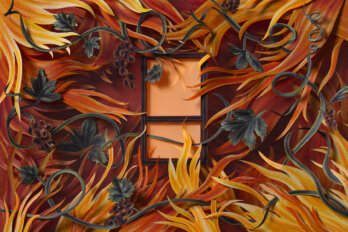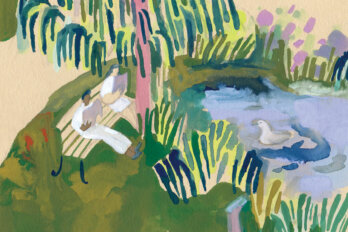He laughed at what passed for tragedy in his new country. Last week, the body of a little girl was found pressed against a sewer grate. She had been catching water spiders on a creek swollen by the spring thaw. A floating barrette alerted a man walking his dog.
Little Caitlin. In the newspapers at the convenience store where he currently worked, and on the televisions at the laundromat where he attempted to wash his new clothes, and during the elevator chatter at the apartment where he now lived, so high above the earth — Little Caitlin. She was everywhere, as was talk of public safety committees and the need for a protective barrier around the creek for when it rose too high. Bokarie would attend the memorial service planned for that Sunday, intent upon fitting in but also a little curious. His manager told him that hundreds were expected, perhaps even a thousand. Each had been asked to wear something pink. That was Caitlin’s colour. If the petition circulating was successful, the town crest would gain a sash, in loving memory.
His old country occupied a corner of the Friday newspaper’s front page. Sopping with sweat, Bokarie carried in the stack at the start of his morning shift. It was April northwest of Ottawa but he remained suspicious of Canadian sunlight. Because his back and shoulder muscles were still atrophied from scar tissue (an unexpected help during his asylum hearing), he stooped over and twined his arms around the bundle to pick it up. He shimmied through the door hunched over. Pressed against the topmost paper, his wet cheek smeared across a thumbnail picture of his old leader, the General. Peeling away the damp smudge, he saw the dark sunglasses and the counterfeit medals and the smart beret that, he had been taught, displayed the elegant monstrosity of blood-and-coin patriotism. The General was smiling. He might have been on his way to prison for crimes against the people or to the palace for finally disposing of the President. Bokarie did not turn to page A20 to find out, just as he switched the radio dial to music whenever he heard “According to UN monitors, the situation in central Africa today became….”
This was the gift of immigration. The past, even if it never in fact became past, remained over there. He was happier this way, safer, over here. He understood that the General, whether as convict or president, had to blame him for what were now known as the Upriver Massacres, even if they happened under his orders, because Bokarie had escaped. interpol, the RCMP, the FBI — they might have been searching for him already, depending on what deals had been struck. He dragged cinder blocks against his apartment door each night.
He was not angry with the General for his betrayal, or for trying to have him killed, or even for the men he bribed to do it. This was the way in their country.
The scorpion got across the river on a turtle’s back and stung him just before the shore. A fish swallowed the scorpion. If the fish didn’t choke on the stinger, if the fish wasn’t speared, if the fish swam hard enough, sometimes it reached clearer waters. Then a bird would swoop down.
A woman walked into his store just as he finished stacking the papers. Her eyes, he thought, were like this country. Big and empty. She had a kerchief tied around a sweep of straw-coloured hair. Buttons sprayed with slogans and symbols fanned out across her wide skirt. She wore the indignantly pink T-shirt that he saw often these days on the bus and at the supermarket. She was holding a pink box shaped like a dollhouse. Her lips pursed. She was about to make a speech. He knew this. He had made speeches in his old country. Oh such speeches.
“There will always be growing pains when a great nation is reborn! If a few sandals fall into the fire, or a little woman — blood mixes into the ashes, what great loss is this? My brothers, it is no loss. My own mother, my own woman, my own child — they have fled, have starved, have been killed in the first wars of the new history, after the British and the French and the Germans left us to fight among ourselves for the right to tend our own fires. Meanwhile, the tribes upriver have guns and electricity and water and maize. They have as many goats in their fields as we have vultures above our huts. Do you wonder why? They worship the swine that squeals in the capital city, our self-appointed president-for-life, who sells our wives and daughters to Nike Red Cross US of A, who protects the upriver villagers and fills their troughs because they are all of that snub-nosed, mongrel tribe.
“There is one man who can put an end to this. The General. And he has told me that only the eldest and purest people of our beloved homeland can help him cleanse what has been soiled. This is why he has asked us to reclaim our ancient lands as part of his national restitution campaign. This is why we must crush the chirping locusts that sing of the President’s greatness and slaughter the dancing baboons that step to his orders. This is why we will at last greet rosy morning from the moist earth that your fathers’ fathers left to you. Brothers! For our sons, for our General, for our nation!”
Bokarie remembered his speeches while adding cherry syrup to the slush machine. In his new country, he picked out scratch cards for old ladies. They treated him with pity and fear and kindness and curiosity. They gave him zoological stares. He answered their question each time with a different country. This was for practical reasons, though it was also a satisfying entertainment. Yes, I am from Haiti. Indeed, I was in Rwanda. Madam, you can tell that I lived in Sierra Leone. In truth, I did flee the Congo. He confirmed their vaguely Christian, blandly Canadian sympathies. The civil war was even worse than what is shown on televisions here. The earthquakes swallowed my home and family. When the Americans came in their tanks looking for more oil, we had to flee from their boasts of freedom.
Her lips opened. “Good morning. Will you put this on your counter? It’s a donation box for the Caitlin Fund. This is my charity certification card. It says my name is Jennifer. If you agree, this establishment will be added to a growing list of local business sponsors. I will give you one of these official ribbons. Caitlin’s family and friends will be very appreciative. We need all the help we can get to raise awareness. I’m honoured to be in charge of organizing the community’s response to this tragedy and would be honoured if you joined us.”
He responded to her slow loud words with the pidgin English he had practised with a friend in the oil tanker’s hold while heaving across the Atlantic toward this little pageant of Canada, convenience stores, and Caitlin.
“Thank you. It is much worthy cause. I know this truth. In my old country, the heavy rains bring much death to our children.”
The woman tilted her head to one side, thoughtful like a dog hearing a new sound.
“Oh you poor man. So you must know what it’s like to lose a loved one. And to come to your new country to escape such things and find them here too! Little Caitlin isn’t the only one, but with your support we can help make sure she’s the last.”
“Yes. But I must ask manager if allowed to put box here. I like much the pink ribbon. Is it okay, you give? Where I come from, pink means the colour of the dawn.” Her fingers pressed against the walls of the dollhouse, her mouth turning with impatience, forethought.
“Such eloquence! You’re probably one of those foreign intellectual types who can’t get a job when you come over so you get stuck doing this kind of stuff. Last week my taxi driver was from Bangladesh. He said he was a doctor. You should do esl at night school. It’s funded. You just need to believe in yourself. Like Little Caitlin did. How about the box?”
“I ask boss man. My ribbon?”
“Sign this petition. And come to Centennial Park this Sunday for the memorial rally. I’ll look for you there. How come you’re still wearing your parka?”
Bokarie would send his young and hungry men off to each raid with speeches given from the back of a derelict aid truck. Later he’d arrive to crunch an elder’s jaw-plate against a gutter or to shoot a lingering dog. To proclaim victory. He would inspect remnants of the burnt-out villages reinvented as cities of the new nation, dividing the charred land into lots for squadron leaders baptized as local constables. On the General’s behalf and in the name of peace, he attended muggy prayer vigils for the souls of the dead travelling to the cool gardens of the afterlife. Keeping with custom, he would wrap his copper-wire arms around the shuddering survivors in sympathy, those who had had enough time to flee into the brush or find one of the UN camps when they heard the rebel anthems sounding up the road. Husbands and mothers and wives and fathers, they had no choice but to accept his comfort, though they knew who and what Bokarie was. The terror of possibilities blunted their know-ledge of his crimes.
After each visit, he would report to the General. They spoke by satellite phone to make plans for the next incursion. He would receive instructions and then a reminder of how he had been raised up, how his help was needed to bring order to their nation. Mention would be made as well of future rewards. Bokarie would then return to the corrugated shed where he lived with two brothers and a cousin. He had promised each of them a village, a television with DVD player, and local virgins once the General named him governor of the northern province.
But men’s plans are in agreement for the space between a butterfly’s wings or, as in his old country, the span of a razor blade. His militia was only awaiting a final order, poised southeast for its triumphant entry into the capital city. He imagined that the General would greet him personally, that he might even be asked to address the national assembly, but by the time Bokarie took the last village, bones and rumours of the first raid had reached the demilitarized zone and the foreign press pool. Soon, donor nations were murmuring. In the lightbulb cafŽs and at the dust-whorled checkpoints, strange words began squawking out of the transistors. Power-sharing and reconciliation and sanctions and multilateral intervention. Suddenly the General was on CNN embracing the President. A smiling American diplomat was standing behind them, his meaty hands gripping their shoulders. When the General addressed the nation, his tongue was hot and sharp with the language of the new world politics.
“A security coalition will rid our stricken nation of the terrorists and evildoers butchering the river people to the north. With the support of the international community, firm and fearless leadership will bring an end to this tyranny. Freedom will march where it is needed.”
Three days later, Bokarie’s younger brother carved a wide arc across his back with a knife while he was reading a map. He had just found a shallow creek crossing into the unmonitored brush of a neighbouring country. His cousin shot the assassin in the ribs and neck. Searching the body, they extracted a pair of dark blue passports, payment in advance from the now impossible-to-reach General. Quickly tracked down, Bokarie’s older brother pleaded his innocence. It was unconvincing. Fortified by cane liquor, his back bleeding through a poultice of banana leaves, Bokarie then set out for the river with his cousin. His turtle.
The passports were good enough to barter in Africa but too crude for travel beyond. He traded the first to get through the sandpaper-and-scrub interior. The second dropped him into a tanker headed for the deliciously named Newfoundland. Wedged between the barrels, he befriended a nervous Liberian and helped him prepare for his asylum hearing. He learned his name and story. Later, when he crushed the man’s windpipe, the others in the hold shifted positions to absolve themselves of witness. The altruism of survival. In a St. John’s impound yard two weeks after they reached the shore, a German shepherd sniffed out the body. By then, Bokarie was in a warehouse dormitory studying refugee relocation pamphlets.
He stepped off the bus and entered the park. Everything was thick and wet with spring. Damp in his heavy coat, he dripped his way into a solemn pink sea. The family was on a stage flanked by monstrous posters. Baby Caitlin, toboggan Caitlin, school Caitlin, birthday Caitlin, soccer Caitlin. A flotsam of cameramen and civic leaders was crushing them.
As he drew close, Bokarie saw the big and empty-eyed woman from his store, Jennifer, teetering at the edge of the stage, trying to control the roseate flood of sympathizers. An old longing returned. His help was needed.
Tilting her sunglasses, Jennifer glimpsed a pink ribbon flailing in a black hand; it was raised up and floating forward. She remembered him, the pitiful and eloquent African engineer stuck behind a lottery and cigarettes counter. He was starting to figure this place out, she sensed, noticing the clump of a winter jacket he had just dropped on a chair as he plodded toward her. He had lost a child to flooding as well, she recalled. She decided that there was currency in bringing a sympathetic new Canadian onto the stage. She was planning to run in the next election, her campaign centred on a bill for drainage security. Think Pink would be the motto. A global dimension could help. She beckoned and he scuttled up. They nodded at each other. She was, for a moment, surprised by what happened next.
Bokarie broke past her, his thin frame cutting toward the family. He embraced them with an ancient comfort. Though startled to be wrapped up in this black man’s unexpected soaking clinch, they were too polite to writhe. The audience was quietly, curiously watching.
After a measure, Jennifer intervened, now in control of the stage. She swivelled Bokarie around and guided him forward, her hand pressing against the crest-shaped scar on his back as she whispered instructions. He did not recall the pain. He was smiling. New words started crawling across old sentences. There were photographs. There was applause. There was only possibility in his new, temperate country. Such a shiny microphone!





